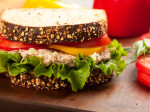-
Protein provides the building blocks of amino acids to allow for muscle mass and tissue repair, but it is the carbs that fuel this body building process. Encouraging people to control,not cut, their carbohydrate can be a challenge. Read more »
-
Heat stress can be a concern for all of us but in particular young and elderly people, athletes and people working outside in the heat such as in the construction industry, farming, forrestry etc. Learn more Read more »
-
Authenicity is a buzz word right now but when it comes to food how authentic is the nutrition information we receive? Where does your food and nutrition information come from? Is it meeting your needs? Learn more... Read more »
-
While New Zealand may be very successful at producing food our health statistics tell a very different story. Let's take a look at the impact ultra-processed foods are having on hidden hunger, our gut and mental health. Read more »
-
At a time when they are also growing, young athletes may need as much as 50% more protein than their more sedentary peers. So should this extra protein be consumed from whole foods or supplements? Learn more...
Read more »
-
Globally there is disruption to supply chains, inflation, changes in technology and war in many regions. Food systems are experiencing instability which is changing the trends in our choice of food, beverages and fitness. Read more »
-
With families on the go every day it’s often easier to down a smoothie for breakfast than to sit down and eat. While this is certainly better than not eating at all we really do need to take the time to chew our food. Find out why?.. Read more »
-
Thinking of skipping breakfast? If you think you'll be saving time, money and calories then think again. Research finds you are more likely to miss vital nutrients peculiar to breakfast foods and to snack on more calories later on. Read more »
-
Whether you are an athlete wanting to improve your performance or just keen to improve your level of fitness, interest is growing in the use of milk as a sports supplement that is good for your health at any age. Read more »
-
Emotional eating isn't an eating disorder. It is a dyfunctional relationship with food. Associated with depression, anxiety and binge eating. It is highly addictive, causes ill health, needs to be taken seriously. Here are tips to help. Read more »
-
Veganism can be a very healthy lifestyle but there are some important things to know about before deciding that veganism is going to be right for you and will provide sufficient energy to fulfil the life goals you have in mind Read more »
-
Are you keen to get healthier this Christmas and 2022? Then start by cutting back on 'added sugar'. Without giving up all carbohydrate there are lots of ways you can control your blood sugar levels. Here's some tips to help. Read more »
-
Although science is constantly evolving, generating new recommendations to improve our health, for many people their eating habits are based on things other than their longevity so are guidelines still relevant today? Read more »
-
Are eggs really cheap and nutritious when compared with other protein rich foods? What about cholesterol? and are they safe to eat raw or if you're pregnant? Find out .. Read more »
-
Whether we sit in or take out it seems our love affair with coffee just keeps growing. Let's take a quick look at the effect our choice of coffee may have on our nutrient intake. Read more »
-
Potatoes are often labelled too starchy, too fattening too boring, but is this fair? As we grapple with Covid-19 maybe it's time to take a fresh look at how eating potatoes nationally could help our health and economic growth Read more »
-
Business is booming in the snack food trade. However not all commercially available foods are good for our health. Find out how planning snacks can help to power your day Read more »
-
New Zealand ranks 13th in the world for coffee consumption ahead of Australia and USA. What are the effects of caffeine on our health and can it improve our performance? Read more »
-
There is something very comforting about a bowl of soup especially on a cold winters day or if you are feeling unwell. Here we compare soups available today and offer guidelines on choosing the healthiest. Read more »
-
Yoghurt is a healthy, economic and beneficial way to supply the body with macronutrients particularly protein and calcium, very convenient as a meal or snack its health benefits could help you. Find out more.. Read more »
-
When used responsibly alcohol can help to relieve tensions in athletes and to build feelings of inclusiveness in a team. However in excess it can slowly unravel training, health and sporting careers. Read more »
-
Fish is high in protein, iron, B group vitamins and essential fatty acids. But not everyone likes it. What can parents do to help their child try it again? Read more »
-
Are nuts healthy and how much do we need to eat in order to enjoy their health benefits? Read more »
-
If you are struggling to lose weight or lower your cholesterol then taking a closer look at your intake of discretionary foods can improve your results.
Read more »
-
Every food item we drop into our supermarket trolley isn’t just affecting us but also the health of those we provide food for. How well do you shop? Read more »
-
It can be so easy to snip the top off a packet of flavouring when cooking. But if we really want to reduce the salt, fat and sugar in our diet natural flavours are best. Find out how. Read more »
-
Increasing the confidence of children to cook from scratch is now seen as part of the strategy to reduce chronic diet related disease and obesity. We offer 12 top foods to know how to cook before leaving home. Read more »
-
Is garnishing getting out of hand? Find out how much energy those "add ons" really do add. Read more »
-
What habits would you like to break? With all eyes on sugar reduction learn the steps to make this happen to achieve better health now. Read more »
-
If playing sport or exercising, understanding the GI can help you to select foods that will provide optimal energy at key stages of activity for better performance.
Read more »
-
Sugar has been the focus of attention lately amidst concerns for our dental health and obesity. But what about fructose, the sugar that intrinsically exists in fruits and vegetables? Could this be injurious to our health too? Read more »
-
Do you get your 5+ A Day servings of fruit and vegetables? Learn how gardening and creative activities can improve your consumption of these foods and maximise their nutritional benefits for better health. Read more »
-
Are you planning a Barbeque this Christmas? It's not hard to lower everyone's saturated fat, salt and sugar intake while still serving beautiful, tasty food. Read more »
-
In a bid to reduce the intake of processed foods many food manufacturers are modifying their products to meet new food guidelines particularly regarding salt. Find out if you are still getting too much? Read more »
-
As concern, regarding the sugar and energy content of carbonated drinks and fruit juice, gathers momentum many people are looking for alternative drinks to have. Read more »
-
As the popularity of gluten- free diets grow we need to question whether in fact it is a healthy option for any of us and if not how can we make it so? Read more »
-
If we choose a lifestyle where others grow and process our food can we be sure that it is still safe to eat? Find out more. Read more »
-
Is dieting still fun if it ages you? Find out if your diet ticks all the boxes for your better health and performance. Read more »
-
Organic foods are more expensive but as more farms convert to organic food production the costs do come down and the savings to the environment by reducing pollution and conserving water and soil quality may, in the long-term, be money well spent Read more »
-
While fish can also contain some mercury it is still possible to enjoy the health benefits of eating fish and keep the exposure to mercury within safe limits. Read more »
-
For busy people, who might rather drink than chew their fruits and vegetables, the juicing trend sounds like a "gods send". What possible disadvantages could there be to health? Find out the pros and cons of this new diet craze. Read more »
-
Taste is an important factor affecting fluid choice and level of consumption and therefore is an important consideration to overall sporting performance Read more »
-
Gaining an understanding of the many factors contributing to a sense of fullness can provide some very powerful tools for those seeking to lose or control body weight and find more energy for life! Read more »
-
How safe is cow’s milk in the raw and homogenised state? When can cow’s milk be given to infants and how can we protect children against developing allergies to cow’s milk? These are just some of the questions that have come up in the media lately and are in need of some clarification Read more »
-
Muesli and sports bars are designed to provide a convenient source of energy to be thrown into a lunchbox, gym bag or pocket and eaten “on the run”. However if eaten daily as a “lolly” or relied on as a meal replacement they can lead to unnecessary weight gain. If used wisely during training and competition they can provide athletes with a measured source of carbohydrate vital to performance. Read more »
-
Coming home to a nutritious cooked family meal was once the norm for many of us. Recent social change however is now seeing more people living in single dwellings many of whom are turning to meals “on the run” that are quick and easy to prepare Read more »
-
Coconut oil was once associated with tanning. Something young people coated themselves with before lying out in the sun “to bake”. Today coconut products are being heralded by many as the new “wonder food" that can cure many ailments. We take a look at some of these claims.
Read more »
-
Research does show more injuries occur in the mid-late afternoon in open country than other times of day. This is often when people become dehydrated, their muscle levels of energy (glycogen) can become depleted and blood glucose levels may be falling, all factors which lead to fatigue Read more »
-
After years of encouraging a low fat diet with some success (a decline in heart disease and some forms of cancer) attention is now focusing on sugar as a possible reason for our weight and diabetic problems. Read more »
-
Research shows that a diet high in fibre can reduce the risk of developing diseases such as type 2 diabetes, coronary heart disease, bowel and breast cancer, gallstones, diverticular disease and weight gain. It also seems that some fibres are better than others. Read more »
-
If you are thinking of cutting fat out of your diet stop right now. Fat is important for nerve and cellular function but choosing the right “type” of fat is what matters most to our long term health. Read more »
-
Fat carries more energy than other macro nutrients (9kcals/37kJ/g compared to 7kcal/29kJ/g for alcohol and 4kcal/17kJ/g for protein and carbohydrate respectively). So with so much energy to offer does eating more improve performance?
Read more »
-
In New Zealand around 258,886 tons of food waste is dumped in landfill each year. This equates to around 64kg of food waste per person/year in NZ compared to 82kg /person/ year in the USA. Read more »
-
Did you know that in 2012 around 21% of New Zealander’s weekly food expenditure was spent on eating out and takeaways? Read more »
-
Some people find it hard to control snacking and are continuously thinking about food. They may find themselves constantly picking, stock piling foods in drawers and cupboards at home and work. Read more »
-
If you want to enjoy the company of friends and family when you get older then if is important that you look after their health, as well as your own, as you age. Read more »
-
Free foods", while bulky, are very low in energy and filling. So their cost in terms of calories is much lower than most other dietary components, hence the term "free". As these foods are also naturally fat free they make ideal snacks for anyone trying to control body weight Read more »
-
Birthday parties should be fun and the chance to celebrate a child’s special day with a minimum of work and cost for busy parents. If the party can be timed to fit around a normal meal time then “junk” foods can be kept to a minimum.
Read more »
-
When family members are sick or hospitalised it can be very challenging to find the time to exercise and maintain a healthy diet for yourself. Particularly if you are working, caring for children, or trying to complete a course of study.
Read more »
-
In 2015 New Zealanders consumed a total of 518 million liters of carbonated drinks.
Outside of the drinking of milk and water there is real concern about the energy content of some of these beverages because of our rising incidence of diabetes and obesity.
Read more »
 Measurement is an important evaluation tool at any time of the year, it is only human nature to want some means of measuring progress; however can we rely solely upon any particular measure and expect to obtain a reliable result?
Measurement is an important evaluation tool at any time of the year, it is only human nature to want some means of measuring progress; however can we rely solely upon any particular measure and expect to obtain a reliable result?































































Leave a Reply